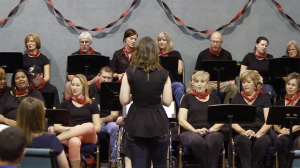TTUHSC School of Health Professions Hosts Aphasia Arts Camp
StAR Program summer camp works to rebuild language in stroke survivors
 The Texas Tech University Health Sciences Center (TTUHSC) School of Health Professions
Stroke/Aphasia Recovery (StAR) Program will host its annual Aphasia Arts Camp weekdays
June 6 through June 16. The camp will culminate with a concert and theater performance
on Thursday June 16 at 7 p.m. at Quaker Avenue Church of Christ, 1701 Quaker Ave.
The Texas Tech University Health Sciences Center (TTUHSC) School of Health Professions
Stroke/Aphasia Recovery (StAR) Program will host its annual Aphasia Arts Camp weekdays
June 6 through June 16. The camp will culminate with a concert and theater performance
on Thursday June 16 at 7 p.m. at Quaker Avenue Church of Christ, 1701 Quaker Ave.
Aphasia affects approximately 1 million individuals in the U.S., according to the American Speech-Language-Hearing Association, and strikes as the result of a stroke or other brain injury. The condition creates difficulty producing and understanding language and reading and writing. However, aphasia does not interfere with or diminish intelligence. Each year, the summer camp serves as a way for persons with aphasia to express themselves creatively, which is particularly meaningful to individuals who have lost the ability to speak.
“We purposely hold our aphasia arts camp during June, which is Aphasia Awareness Month,” said Melinda Corwin, Ph.D., professor and director of the StAR Program at the TTUHSC Department of Speech, Language and Hearing Sciences. “Studies have shown that creativity, when combined with other speech therapies, can be helpful in improving the condition of aphasia.”
Corwin said many people with aphasia are able to sing, even if they cannot talk. Singing involves the right hemisphere of the brain, which is typically not damaged with aphasia. Speaking involves the left hemisphere, which often is damaged with a stroke or brain injury, resulting in a loss of speech. This phenomenon makes the aphasia choir possible. However, despite the condition affecting more people than Parkinson’s disease, many have never heard of the condition or have incorrect beliefs about aphasia and its effects.
“The camp and performance display the talents of StAR Program participants and give them an opportunity to express themselves, while also raising awareness about aphasia,” Corwin said. “The event changes misconceptions and shows that a loss of language is not a loss of intelligence or creativity.”
For more information about the StAR Program or summer Aphasia Arts Camp, call (806) 743-9050.
Related Stories
How Does Your Garden Grow?
As spring approaches, some people’s thoughts turn to gardening. Whether it’s a flower garden they desire or a vegetable garden want to have, they begin planning what they’ll plant and what they need to do to ensure a successful garden.
Adopt a Growth Mindset for a Better Life
A “growth mindset” accepts that our intelligence and talents can develop over time, and a person with that mindset understands that intelligence and talents can improve through effort and learning.
Drug Use, Family History Can Lead to Heart Disease in Younger Adults
Abstaining from drug abuse and an early diagnosis of familial hypercholesterolemia (high cholesterol) can help prevent heart disease.
Recent Stories
The TTUHSC Laura W. Bush Institute for Women’s Health Welcomes Ben Carson as Power of the Purse Keynote Speaker
Retired neurosurgeon and former U.S. Secretary of Housing and Urban Development Ben Carson, M.D., delivered a keynote address at the Power of the Purse luncheon and fundraiser today (April 18).
Filling the Gap: PA Impact on Rural Health Care
Assistant Professor and Director of Clinical Education Elesea Villegas, MPAS, PA-C, spoke about the challenges rural health care currently faces and how PAs are stepping up to better serve the rural patient population.
School of Pharmacy Remembers Contributions of Key Collaborator
Cynthia Nash, Pharm.D., served as an Adjunct Assistant Professor of Pharmacy Practice for the School, and was an instrumental collaborator and key ally in our partnership with the Dallas VA North Texas Health Care System.
